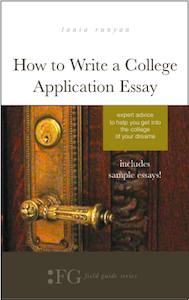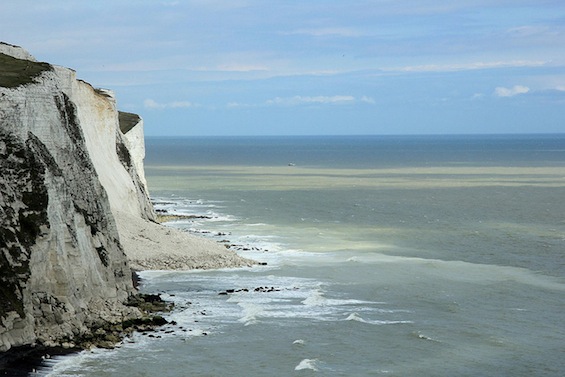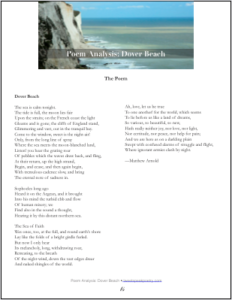Dover Beach Poem Analysis
The Poem
The sea is calm tonight.
The tide is full, the moon lies fair
Upon the straits; on the French coast the light
Gleams and is gone; the cliffs of England stand,
Glimmering and vast, out in the tranquil bay.
Come to the window, sweet is the night-air!
Only, from the long line of spray
Where the sea meets the moon-blanched land,
Listen! you hear the grating roar
Of pebbles which the waves draw back, and fling,
At their return, up the high strand,
Begin, and cease, and then again begin,
With tremulous cadence slow, and bring
The eternal note of sadness in.
Sophocles long ago
Heard it on the Aegean, and it brought
Into his mind the turbid ebb and flow
Of human misery; we
Find also in the sound a thought,
Hearing it by this distant northern sea.
The Sea of Faith
Was once, too, at the full, and round earth’s shore
Lay like the folds of a bright girdle furled.
But now I only hear
Its melancholy, long, withdrawing roar,
Retreating, to the breath
Of the night-wind, down the vast edges drear
And naked shingles of the world.
Ah, love, let us be true
To one another! for the world, which seems
To lie before us like a land of dreams,
So various, so beautiful, so new,
Hath really neither joy, nor love, nor light,
Nor certitude, nor peace, nor help for pain;
And we are here as on a darkling plain
Swept with confused alarms of struggle and flight,
Where ignorant armies clash by night.
—Matthew Arnold
The Poem Analysis
Matthew Arnold achieves a lonely tone in the poem “Dover Beach, ” through the use of imagery, simile, and personification.
The poem begins with a simple statement: “the sea is calm tonight”. At this early moment this is as yet nothing but a statement, waiting for the rest of the work to give it meaning. The statement bodes of the significance the sea is going to play as an image in the poem. The first part of the stanza seems to reflect on the sea’s calmness. As yet, there is no emotion or thought, only images, quiet. But! By the fourth line, already, something has changed. An ephemeral contrast to the timeless sea is introduced: “on the French coast the light gleams and is gone” (emphasis mine). Lonely imagery builds: the “cliffs… glimmering and vast”, the “tranquil bay.” In line nine another voice is added to the melody, literally—sound. “Listen!” the line starts, and goes on to add to the still, silent imagery that came before it—a voice, a presence, a roar—and movement, movement of waves which until now have not been described as moving. How are they moving? Out and in, returning ever, a cycle unending. This imagery will appear again and again in the poem. The last two lines of the stanzas start to add the feeling more pointedly, now that the mood has been set: the waves have a “tremulous cadence slow, ” that brings “the eternal note of sadness in.”
In the next stanza, the sound imagery continues, even as the poem reaches out through history—“Sophocles long ago heard [the eternal note of sadness] on the Aegean [sea]” and it brought to his mind human misery. Here we have a comparison between human misery, ebbing and flowing, and the sea, ebbing and flowing. Arnold continues the comparison by adding another note: not only is human misery like the sea, so too is human faith, which “was once, too, at the full, ” and then with a bit of simile continues: “like the folds of a bright girdle.” Perhaps that would count as personification of the earth, because a girdle is something humans wear. But the persona who speaks now hears only its “melancholy, long, withdrawing roar.” The tide is going out, leaving the “naked shingles” of the world, which literally means the loose pebbles that collect on beaches, but of course also brings to mind a lonely house.
The last stanza goes back to the beginning, to those beautiful calm images, and says, “the world, which seems to lie before us like a land of dreams, so various, so beautiful, so new, ” isn’t any of that. Really, the world “hath neither joy, nor love, nor light, nor certitude, nor help for pain.” The speaker and the listener, perched at the window (an edge-like place), are like the light that gleams and is gone from the edge of the land (the French coast). The poem ends with its strongest lonely image of “a darkling plain… where ignorant armies clash by night.” The speaker and the listener’s lonely state—which they are trying to fend off with their mutual love—extends to all of humanity, as suggested in this final dark picture.
Featured photo by Bart van Dorp and in-post photo by Karen Roe, Creative Commons, via Flickr.
___________

“How to Write a College Application Essay is a valuable resource that I enthusiastically recommend to my students and their families.” —Lisa Scanio, High School Counselor, Adlai Stevenson High School
- Good News—It’s Okay to Write a Plot Without Conflict - December 8, 2022
- Can a Machine Write Better Than You?—5 Best (And Worst) AI Poem Generators - September 26, 2022
- What to Eat With Dracula: Paprika Hendl - May 17, 2022



Maureen Doallas says
As always, an excellent analysis of a poem, Sara. You have a bright future if you decide to write criticism.
Sandra Heska King says
Beautiful, Sara!
Interesting… when I went back to read a second time, I realized I’d read this:
“you hear the grating roar
Of pebbles which the waves draw back” as
“you hear the grating OAR
Of pebbles which the waves draw back”
And I was instantly transported to a rowboat. I heard that grating and creaking.
Brighton says
What a well learned analysis. I can now hav a clear picture of what is transpiring.
Katie says
So what? I don’t feel the ‘so what’ ever answered.
Jesse Stripling says
The so what answer, or theme of the poem, centers around our perception of reality. The ebb and flow of the tide, when compared to the ebb and flow of human misery and faith, contrasts the dichotomy of permanence and fleeting whimsy in the very things which we believe give us meaning as humans. The author’s plea to love that they be true to one another is almost desperate as he contrasts that hope with the realization that the world,
“Hath really neither joy, nor love, nor light,
Nor certitude, nor peace, nor help for pain”.
The overall so what question is answered in the realization that the world itself, like the blank cliffs or seemingly calm seas hide nothing or everything depending upon the the eye with which you look upon it. The world has no meaning but the meaning we assign to it, and this is both stirringly beautiful and strikingly terrifying to think about. Much as the vast mystery of the sea itself.
Sir Kulwa says
Can you make a full analysis of the poem ” Dover beach” according to Arnold ‘s poetic theories
Honey says
Fabulous
Arnab says
I don’t understand the poem….but after reading this i have learned a lot..so its wonderful….
Sir Kulwa says
Can you make a thematic and diction analysis of the poem “Dover beach”
Mike says
Dover Beach is Arnold’s response to Darwin’s recently published Origin Of The Species. Darwin’s book shook the foundations of religion throughout Europe. Once you understand what this poem is about you can appreciate it even more.. read it in that context and it will be a very different emotional experience for you.
Dave says
It is a little known fact that Darwin, in the 3rd period of his life, (the first being his religious studies to prepare for the Priesthood, the second being his agnostic period), considered himself a theist.